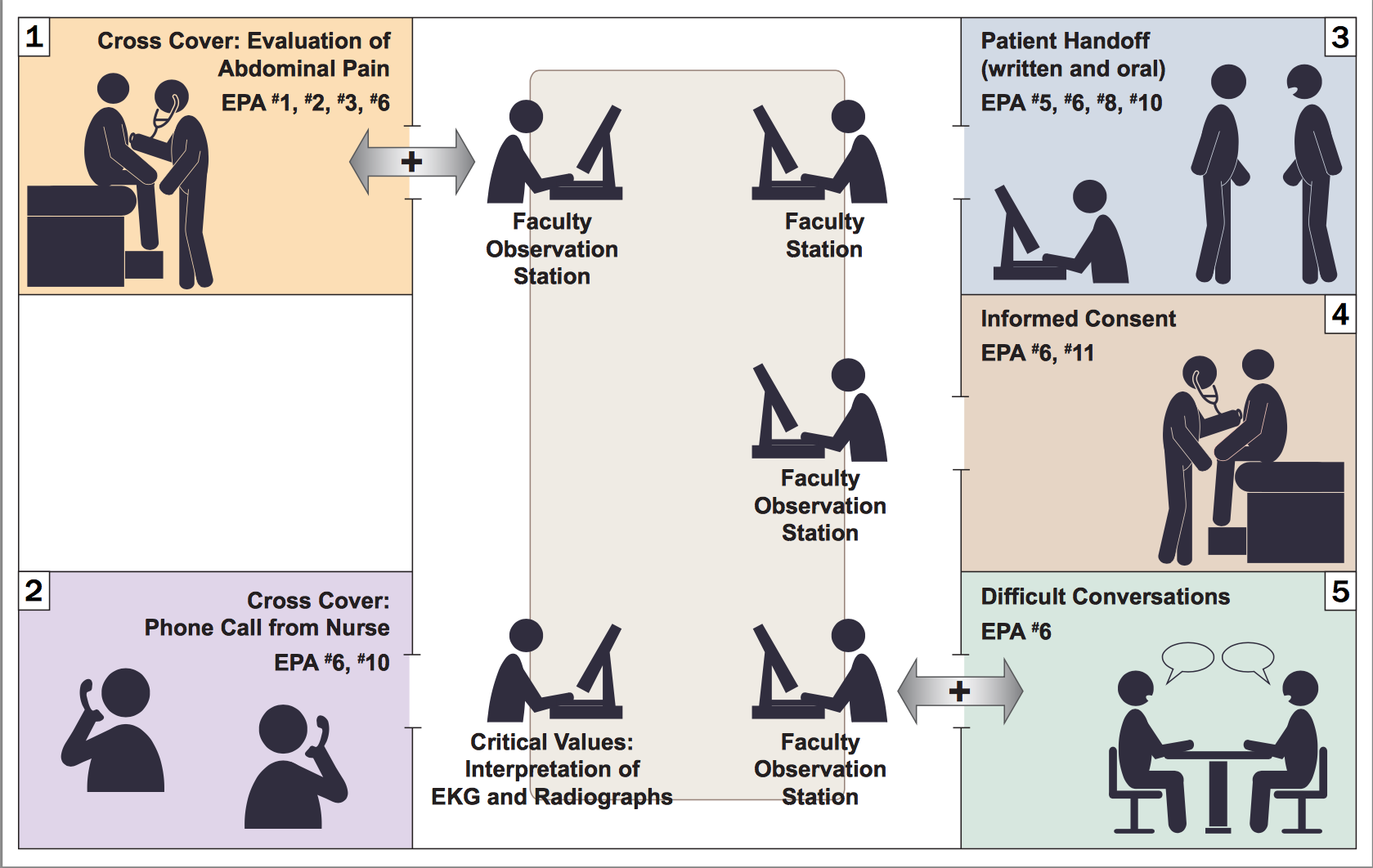Since its first year through last year’s virtual version, the Objective Structured Clinical Evaluations (OSCEs) has held to its guiding principle: establish a clear sense of the incoming intern’s skill level by observing them performing foundational tasks. Standardized rubrics, simulated patients, technology enabling the observation, all of these are in aid of making sure that the faculty within University of Iowa Health Care know what their trainees know and where they should focus their coaching.
The initial idea emerged from the partnership of Program Director Manish Suneja, MD, and Education Development Director Jane Rowat, MS. The two understood that different medical schools emphasized different skills and wanted to create a tool that could measure incoming intern classes equally. From there it was a matter of choosing which of the Entrustable Professional Activities, as defined by the American Association of Medical Colleges, could be combined and observed in a series of simulated situations.
For more details on the structure and strategy, read our previous OSCE coverage in these posts.

And the idea has caught on. Since that first year, other departments have joined, both in running their interns through the stations, as well as providing faculty observers. This year, internal medicine interns were joined by trainees from the Medicine-Psychiatry, Family Medicine, Family Medicine-Psychiatry, Ophthalmology, and Dermatology programs—a total of 44 interns. Kate Thoma, MD, one of the organizers of the OSCE from the Department of Family Medicine put this “44” in context: “This is a third of all the interns starting this week at UI Health Care.”
It is more than just interns at Iowa. IM Residency graduate and former Chief Resident Sheena CarlLee, MD, is first author with Suneja and Rowat on the first paper on the OSCEs published by the Journal of Graduate Medical Education in 2019. Earlier this week, CarlLee, now Associate Program Director at University of Arkansas for Medical Sciences Northwest, texted a photo to Suneja with the message, “OSCEs come to Arkansas!”

In addition to ambassadors from Iowa, other programs are taking notice on their own. Suneja and Rowat have been approached by multiple institutions, including the Miller School of Medicine at the University of Miami to collaborate and help implement similar OSCE experiences for their institutions. Suneja and Rowat will present the program to representatives in the coming weeks. Suneja also reports that multiple national bodies working on the undergraduate-to-graduate medical education transition are recommending that all incoming interns participate in similar formative assessment during orientation.
In Iowa’s OSCEs, the interns are not the only ones receiving just-in-time feedback. As with previous years, they also have an opportunity to provide feedback on their just-completed exercise. Previous classes have made suggestions for improvements to the OSCEs, which were implemented in subsequent years.















Thank you to this year’s observers:
Department of Internal Medicine
Desmond Barber (Chief Resident)
Sydney Bowmaster (Chief Resident)
Chandrikha Chandrasekharan
Brian Gehlbach
Amanda Heuszel (former Chief Resident)
Derek Hupp (Chief Resident)
Krista Johnson
Carly Kuehn
Mark Rostad
Justin Smock
Matt Soltys (former Chief Resident)
Jennifer Strouse (former Chief Resident)
Roger Struble (former Chief Resident)
Melissa Ludgate (former Med Psych Chief Resident)
Katie White
Yana Zemkova (Chief Resident)
Department of Family Medicine
Meghan Connett
Scott Larson
Stephanie Pickthorn (Chief Resident)
Brigit Ray
Marcy Rosenbaum
Wendy Shen
Kelly Skelly
Kate Thoma
Logan Wilz (Chief Resident)
Suneja offered his own thanks as well:
“A big thanks to Jane Rowat for making sure that the planning of OSCE was done to perfection. Thank you to Abbey Gilpin for managing the Zoom and Cindy Batzkiel for all the logistical support. Thank you as well to Ellen Franklin, the proctors in all the clinical observation pods, and the many simulated patients for their professionalism and commitment to medical education!”
One comment on “OSCEs turn five, inspire other programs”